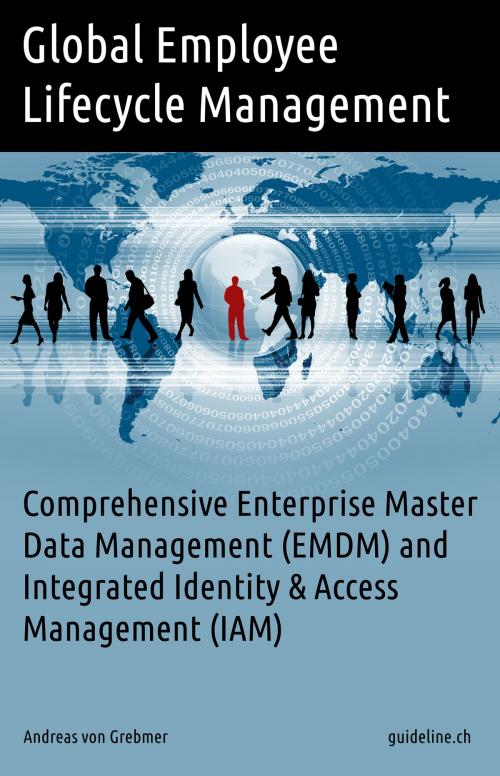Global Employee Lifecycle Management
Comprehensive Enterprise Master Data Management (EMDM) and Integrated IAM
Nonfiction, Computers, Advanced Computing, Theory| Author: | Andreas von Grebmer | ISBN: | 9781623092207 |
| Publisher: | BookBaby | Publication: | June 9, 2012 |
| Imprint: | Language: | English |
| Author: | Andreas von Grebmer |
| ISBN: | 9781623092207 |
| Publisher: | BookBaby |
| Publication: | June 9, 2012 |
| Imprint: | |
| Language: | English |
Why should you read this book? To learn about crucial points in Employee Lifecycle Management (ELM), Identity and Access Management (IAM) and Enterprise Master Data Management (EMDM). • Connect the dots on Enterprise Master Data Management (EMDM) • Understand the relationship between ELM and Access Management. • To learn about the competitive advantage and cost savings that comprehensive Identity and Access Management (IAM) bears. • To learn about security and compliance aspects of IAM. • To learn the key points which enable a good and beneficial implementation of IAM. • To bridge the functional gap between Human Resources and IT. Who should read this book ? Master Data Manager, Chief Executive Officer (CEO) or Chief Operating Officer (COO), Chief Financial Officer (CFO), Chief Information Officer (CIO), Business / Line Manager, Chief Risk Officer or Chief Security Officer, Chief Information Security Officer (CISO), HR Manager, IT Project and IT Quality Manager, IT Architects, Business Manager, Data Privacy Officer, Legal Council, Internal and External Audit. Business Excellence Manager. Employee Lifecycle Management (ELM) is a process for administering employee data during all stages of their employment (hiring, on-boarding, transferring, retiring or off-boarding). Transferring from one stage to the other is always susceptible to errors, data loss and data inconsistency. A well implemented ELM reduces the negative impact caused by transfers and changes of employee status to a minimum and feeds lessons learned about common mistakes back into the organization and processes. When you talk about Employee Lifecycle Management you talk to a great extent about Identity and Access Management (IAM). IAM is more than just an IT acronym; it is the basis for ELM in a modern, global and scalable enterprise. IAM can save you money by enabling fast, reliable, secure and cost efficient business and workflow processes. Nowadays, optimized administrative processes are the basis for competitiveness in supporting functions. Bad implemented or unmanaged IAM can be the source of high costs and hence enforce the pressure for outsourcing. There are several technological solutions to implement IAM on the market. This book will only skim them and provide an overview as merely buying a tool is not the solution. The integration of a tool would miss the potential benefits of fully integrated IAM by far. If you ask yourself questions like • What is the business case? • Can you really save money with IAM? • What are other benefits? • What are the pitfalls? • What are the consequences of doing nothing Read this material and you will get answers to most of your questions regarding ELM and IAM. The big dilemma we are facing today, mainly in regulated industries (healthcare, banking, aviation industry). We need to be innovative and save costs on one hand while we need to be compliant with all regulatory and legal requirements on the other. This book delivers: • Enterprise Master Data Management (HR, Finance, Purchasing, IT…..) • Employee Lifecycle Management (ELM) • Business Case examples including Return on Investment (ROI) • Interface Management (IT architecture) • Legal and Data Privacy aspects • An introduction to IAM • Arguments for practicing continuous IAM • Arguments to gain management support for IAM • The relation/dependencies of ELM and IAM • Architectural aspects of IAM • Roadblocks and workarounds Comprehensive Enterprise Master Data Management (EMDM) Master data management is the umbrella covering all functional MDM activities. “IAM Master Data Management” is ideally an integrated part of an existing enterprise master data management or if this does not exist, a standalone one. Comprehensive, means to seek cross-functional agreement by whom and how the company data is defined and handled.
Why should you read this book? To learn about crucial points in Employee Lifecycle Management (ELM), Identity and Access Management (IAM) and Enterprise Master Data Management (EMDM). • Connect the dots on Enterprise Master Data Management (EMDM) • Understand the relationship between ELM and Access Management. • To learn about the competitive advantage and cost savings that comprehensive Identity and Access Management (IAM) bears. • To learn about security and compliance aspects of IAM. • To learn the key points which enable a good and beneficial implementation of IAM. • To bridge the functional gap between Human Resources and IT. Who should read this book ? Master Data Manager, Chief Executive Officer (CEO) or Chief Operating Officer (COO), Chief Financial Officer (CFO), Chief Information Officer (CIO), Business / Line Manager, Chief Risk Officer or Chief Security Officer, Chief Information Security Officer (CISO), HR Manager, IT Project and IT Quality Manager, IT Architects, Business Manager, Data Privacy Officer, Legal Council, Internal and External Audit. Business Excellence Manager. Employee Lifecycle Management (ELM) is a process for administering employee data during all stages of their employment (hiring, on-boarding, transferring, retiring or off-boarding). Transferring from one stage to the other is always susceptible to errors, data loss and data inconsistency. A well implemented ELM reduces the negative impact caused by transfers and changes of employee status to a minimum and feeds lessons learned about common mistakes back into the organization and processes. When you talk about Employee Lifecycle Management you talk to a great extent about Identity and Access Management (IAM). IAM is more than just an IT acronym; it is the basis for ELM in a modern, global and scalable enterprise. IAM can save you money by enabling fast, reliable, secure and cost efficient business and workflow processes. Nowadays, optimized administrative processes are the basis for competitiveness in supporting functions. Bad implemented or unmanaged IAM can be the source of high costs and hence enforce the pressure for outsourcing. There are several technological solutions to implement IAM on the market. This book will only skim them and provide an overview as merely buying a tool is not the solution. The integration of a tool would miss the potential benefits of fully integrated IAM by far. If you ask yourself questions like • What is the business case? • Can you really save money with IAM? • What are other benefits? • What are the pitfalls? • What are the consequences of doing nothing Read this material and you will get answers to most of your questions regarding ELM and IAM. The big dilemma we are facing today, mainly in regulated industries (healthcare, banking, aviation industry). We need to be innovative and save costs on one hand while we need to be compliant with all regulatory and legal requirements on the other. This book delivers: • Enterprise Master Data Management (HR, Finance, Purchasing, IT…..) • Employee Lifecycle Management (ELM) • Business Case examples including Return on Investment (ROI) • Interface Management (IT architecture) • Legal and Data Privacy aspects • An introduction to IAM • Arguments for practicing continuous IAM • Arguments to gain management support for IAM • The relation/dependencies of ELM and IAM • Architectural aspects of IAM • Roadblocks and workarounds Comprehensive Enterprise Master Data Management (EMDM) Master data management is the umbrella covering all functional MDM activities. “IAM Master Data Management” is ideally an integrated part of an existing enterprise master data management or if this does not exist, a standalone one. Comprehensive, means to seek cross-functional agreement by whom and how the company data is defined and handled.















